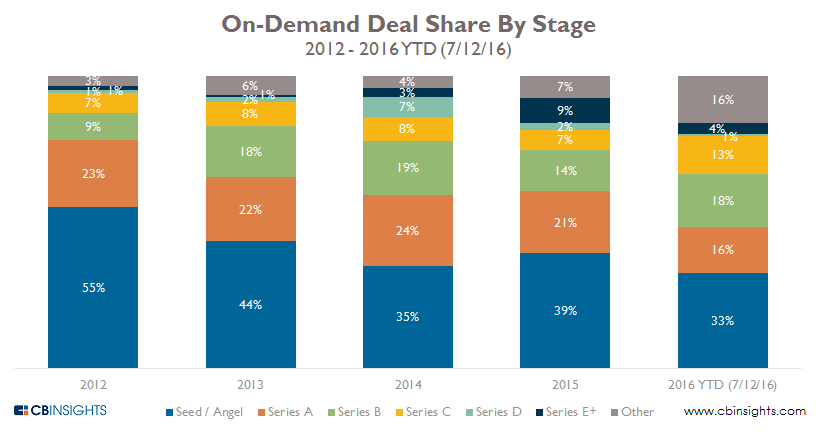The latest quarter marked a dramatic three months for the on-demand category.
- Ride-hailing giant Uber announced a massive investment of $3.5B from Saudi Arabia’s investment fund, while Didi Chuxing received a $1B Series F from Apple.
- Didi and AirBnB tapped the debt markets for massive lines of credit, diversifying away from equity fundraising (Uber followed and took out a $1B+ loan in July 2016). Note: the funding data below is for equity transactions and does not include debt deals.
- Lyft hired Qatalyst Partners, an investment bank known for its M&A expertise, sparking speculation on potential future acquirers.
However, amidst the excitement surrounding top players in Q2’16, the sector as a whole saw deal activity decrease slightly from the prior quarter, marking the third-straight quarter of deal activity below 70 deals when at its peak in Q3’15 the on-demand category saw 90 deals.
Scroll down to view data on quarterly and annual funding trends, deal share by stage, and the most well-funded on-demand companies. Our on-demand category includes private companies that aggregate demand on mobile devices and applications, enabling near-instant access to a wide variety of offline services.
Quarterly on-demand funding trends
Deals to on-demand startups dropped to 55 in Q2’16, down from 66 the prior quarter, but maintaining the sector’s streak of 50+ deals for the seventh-consecutive quarter. Funding dollars grew more than 3.5x from Q1’16, driven by Uber’s $3.5B private equity round and Didi Chuxing’s $1B Series F financing from Apple. Without those two rounds though, funding would still have grown 23%.
Deals and funding both peaked in Q3’15 with $8.3B in funding over 90 deals. Uber and Didi bolstered their war chests with two $1B+ deals each in that quarter, while Chinese food delivery giant Ele.me raised a $630M Series F, and Ucar Group raised a $550M Series B.
Uber, Didi, and AirBnB vs. the rest of on-demand
The below chart illustrates funding in the sector to the top companies — Uber, Didi Chuxing, and AirBnB — broken out as compared to all other on-demand companies. As the chart shows, in many quarters, the top three companies raised more money than all other on-demand startups combined. Especially in Q3’15 and Q2’16, the top three companies accounted for much of the explosive quarterly growth.
Annual on-demand funding trends
If funding rounds continue at their current rate and size, full-year deals and dollars in the on-demand sector may both fall by roughly 20%. However, as mentioned above, the 2015 funding peak was bolstered by a flurry of large $1B+ equity deals to Uber and Didi.
Deal share to on-demand startups by stage
As the industry matures, we note a shift toward later-stage deals over time. The share of seed/angel deals declined from 55% in 2012 to 39% in 2015, and is just 33% in 2016 to-date. At the same time, the share of Series C have jumped from 7% in 2015 to 13% in 2016 to date. Late-stage (Series D and E+) rounds peaked in 2015.
Deals categorized as “other,” including corporate minority rounds, also hit a new high of 16% in 2016 to-date, as big names like Didi Chuxing, Instacart, Uber, Gett, and AirBnB all took corporate minority investments this year.
Uber, Didi most well-funded on-demand companies
Unsurprisingly, Uber tops our list of most well-funded on-demand companies, with a whopping $12.7B in disclosed funding. Most notably, its $3.5B round in June 2016, has been followed by a $1.15B loan in July from Barclays, Citigroup, Goldman Sachs, and Morgan Stanley. This milestone marks a departure from the company’s largely equity-based financing to date. Uber also has multiple corporate shareholders including Toyota and China Life Insurance.
Following Uber is Didi Chuxing, with $8.4B. Didi, like Uber, raised more than a billion dollars in the first half of 2016 alone, including a $1B investment by Apple in May and a $400M corporate minority from Poly Group in June. Uber’s valuation is currently more than twice that of Didi’s — you can check out our comparison of the ride-hailing giants’ valuations over time here.
Our list includes other ride-hailing startups such as Lyft, Grab, Olacabs, Ucar Group, and Gett. Many investors have made multiple ride-hailing bets; we previously tracked overlapping investments in the biggest names using our business social graph.
Besides ride-hailing, home-sharing company AirBnB ranks third on the most well-funded list, and food-delivery startups Ele.me and Delivery Hero rank fourth and sixth respectively.
| Company | Disclosed Funding ($M) | Select Investors |
|---|---|---|
| Uber | $12,659 | Baidu, NEA, Google Ventures, Kleiner Perkins Caufield & Byers, Menlo Ventures, Lowercase Capital |
| Didi Chuxing | $8,447 | Apple, Alibaba, Tencent, Sina Weibo, China Life Insurance |
| AirBnB | $3,395 | Sequoia Capital, Andreessen Horowitz, Kleiner Perkins Caufield & Byers, Greylock Partners |
| Ele.me | $2,335 | Sequoia Capital China, Tencent, Alibaba |
| Lyft | $1,863 | Floodgate, K9 Ventures, Andreessen Horowitz, Tencent, Alibaba |
| Delivery Hero | $1,330 | Kite Ventures, Rocket Internet, Holtzbrinck Ventures, Team Europe Ventures |
| Olacabs | $1,310 | Accel Partners, Sequoia Capital India, Softbank |
| Ucar Group | $1,244 | Legend Capital, China Auto Rental |
| Grab | $690 | Didi Chuxing, Vertex Venture Holdings, GGV Capital |
| Gett | $513 | Access Industries, Volkswagon, inVenture Partners |
Want more data about on-demand funding trends? Login to CB Insights or sign up for free below.
If you aren’t already a client, sign up for a free trial to learn more about our platform.



